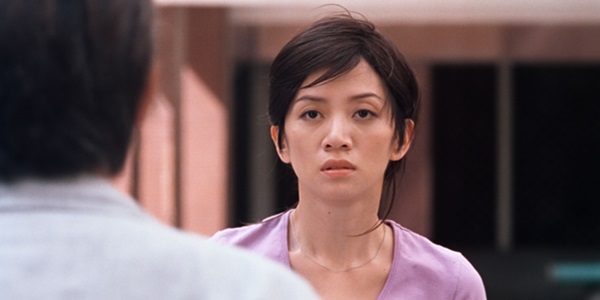It’s so easy to judge adults for their mistakes when you’re young and relatively inexperienced in navigating all of the complexities of life; it’s only when you’re older that you can see their actions from another perspective and start to understand. Such is the case in the 2002 drama July Rhapsody, directed by legendary Hong Kong filmmaker Ann Hui (Boat People, Love After Love) in which the middle-aged protagonist finally comes to terms with the problematic behavior of his long-ago mentor as he wanders down a similar path in his own life many years later. Hui and screenwriter Ivy Ho (Comrades: Almost a Love Story) do not rush to judge him, allowing his melancholic midlife crisis to slowly unfold and wind through the film like the Yangtze river from which he draws inspiration. The result is an elegiac film about unfulfilled lives and faded loves, newly available in a lovely 4K restoration more than two decades after its initial release.
On the Rocks
Lam Yiu-kwok (Jacky Cheung) lives a relatively ordinary middle-class life in Hong Kong; he teaches Chinese literature at a secondary school, struggles with his mortgage, and finds himself drifting away from his longtime wife, Man-ching (Anita Mui, in her final film appearance before her untimely death from cervical cancer in 2003). Yiu-kwok likes his job, but teaching about novels is a far cry from his long-ago dream of writing them, and his meager pay makes him feel inferior to most of his old friends from school who are thriving in business and flaunting their material possessions. Things don’t get easier when he finds out that his own Chinese literature teacher and mentor from his teenage years, Mr. Seng (Tou Chung-hua) has returned to town and is dying. Long ago, Mr. Seng had an affair with Man-ching while she and Yiu-kwok were both his students; the eldest of the couple’s two sons is not actually Yiu-kwok’s, but Mr. Seng’s.

Man-ching feels obligated to spend time with Mr. Seng before he dies, especially since he is now alone in the world; it doesn’t hurt that his presence harkens back to a time when she was desired by another, instead of merely tolerated. Meanwhile, Yiu-kwok channels his frustrations and loneliness into his own inappropriate relationship with a student, Woo Choi-lam (Karena Lam), a talented troublemaker who is determined to seduce him. From relatively innocent food court dates during the daytime to an extremely questionable overnight excursion to visit a friend’s bar in Shenzhen, spending time with Choi-lam helps Yiu-kwok rediscover his lost youth and all of the hopes, dreams, and passions that he held so dear back then. But will this be a mere blip in the life of Yiu-kwok, the way Man-ching was for Mr. Seng so many years ago? Or will Choi-lam’s inspiration help Yiu-kwok realize that it isn’t too late to live the life he wants?
As Time Goes By
Ho’s refreshingly mature script lacks the kind of dramatic confrontations and emphatic conclusions that one might expect from such a story, opting for a quieter and more complex look at the approach of middle-age and all of the mistakes one makes along the way. Endings are left open, with the film punctuated by a question mark rather than a period. The characters struggle and screw up but ultimately survive to live another day; it’s up to them whether they make it a day worth living or continue to merely drag themselves through the slog that they’ve allowed themselves to gradually sink further and further into until it almost feels like more effort than it’s worth to get out.
Cheung and Mui thrive while playing roles that are largely against type, with Cheung the handsome and successful singer transforming into a worn-down intellectual and Mui the beautiful and badass heroine embodying an unfulfilled housewife. A simpler and more heavy-handed movie would be tempted to single out one of these characters as the main villain of the piece, a philanderer of a husband or a harridan of a wife driving their spouse away through sheer unpleasantness. Fortunately, Hui has a light and elegant touch as a director; in July Rhapsody, neither character is treated as more responsible for their increasingly unhappy domestic situation than the other—and they are both given plenty of chances to voice their dissatisfaction.
Holding her own alongside these two iconic actors is the wonderful Lam as the spirited young woman who refuses to let anything get in the way of the big plans she has for herself. Unlike Man-ching and Yiu-kwok, who found themselves tied down (and together) far too young and forced to become adults far too soon, Choi-lam has the luxury of choosing a different path, one filled with adventure, excitement, and perhaps her own mistakes; you know, the stuff life is made of. Cinematographer Kwon Pung-Leung (Ashes of Time, 2046) makes it all look gorgeous, from the subdued palette of life in the Lam home to the vibrant colors and bright lights of the more youthful, lively world occupied by Choi-lam.
Conclusion
Revisiting July Rhapsody is a reminder that Ann Hui is one of the most empathetic and important filmmakers of the Hong Kong New Wave.
The new 4K restoration of July Rhapsody opens at Film Forum in New York on July 18, 2024.
Does content like this matter to you?
Become a Member and support film journalism. Unlock access to all of Film Inquiry`s great articles. Join a community of like-minded readers who are passionate about cinema - get access to our private members Network, give back to independent filmmakers, and more.